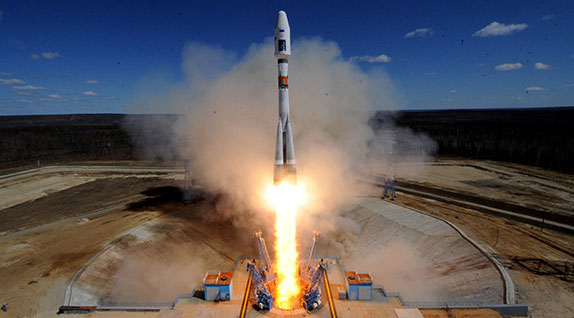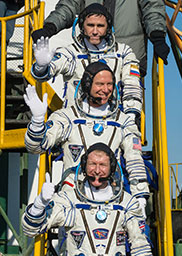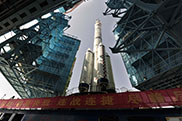 Kirill Kudryavtsev/AFP/Getty Images
Kirill Kudryavtsev/AFP/Getty Images
Article
The race is on for who can become the most prominent space power.
Learn the why behind the headlines.
Subscribe to the Real Truth for FREE news and analysis.
Subscribe NowOver a half-century ago, the world was stunned and Americans shaken. In a remote region of today’s Kazakhstan, the Soviet Union launched Sputnik, the first artificial satellite to orbit the Earth. It was little more than a few pieces of metal with a transmitter and a battery strapped to the top of a missile. Yet it put the Soviets in the lead for the race to space.
Pressured to catch up, United States President Eisenhower signed legislation to create NASA and to invest in science and math education for grade school students. This paved the path to President Kennedy’s bold statement in 1961—the U.S. would send a man to the moon and back before the decade was over. As daunting as this sounded at the time, the nation met that goal when Apollo 11 landed American astronauts Neil Armstrong and Buzz Aldrin on the lunar surface in July 1969.
So began the original space race: a Cold War showdown between Washington and Moscow, the two largest powers left standing in the wake of World War II. Eyeing each other with suspicion, the two nations viewed the expanse of space beyond Earth’s atmosphere as the next front on which to assert global dominance.
The collapse of the Soviet Union ended the Cold War and changed U.S. relations with Gorbachev-era Russia. But the space race did not end. While the United States dominated the Soviet Union in the race for over four decades, today it relies on its former archrival to get there. And while America’s ambition to explore is losing steam, today, more competitors than ever are setting their sights skyward.
New Direction
During his State of the Union Address on January 12, 2016, President Barack Obama spoke before a joint session of Congress: “Sixty years ago, when the Russians beat us into space, we didn’t deny Sputnik was up there. We didn’t argue about the science, or shrink our research and development budget.
“We built a space program almost overnight, and 12 years later, we were walking on the moon.”
 NASA/Joel Kowsky/Getty Images
NASA/Joel Kowsky/Getty Images
He also posed the question, “How do we reignite that spirit of innovation to meet our biggest challenges?” Mr. Obama remarked that the same spirit of discovery that led to the moon landings is “in our DNA.”
Although he used the principle to represent and reinvigorate the race to find a cure to cancer, this was not the first time the American president referred to the moon landings as America’s crowning achievement.
During a speech at the John F. Kennedy Space Center in 2010, the president remarked that “leading the world to space helped America achieve new heights of prosperity here on Earth, while demonstrating the power of a free and open society to harness the ingenuity of its people.”
Nevertheless, the United States remains on the cutting edge. To date, it is the only nation to have landed human beings on the moon. It is the only nation to have sent land rovers to Mars—one of which is still navigating the Martian surface 13 years after its landing.
Currently, NASA is constructing a deep-space crew capsule that it purports will “usher in a new era of space exploration.” Dubbed the Orion, it will be capable of carrying humans to Mars. The spacecraft is on track for completion in the early 2020s.
Despite these advancements, America’s space program no longer rates high on its list of priorities. This has resulted in several tell-tale signs of a waning space program: the cancellation of the shuttle in 2011 and funding cuts in 2017 to certain NASA projects.
Buzz Aldrin, the second man to set foot on the moon, fears America’s waning interest and investment in space exploration could hurt the country’s morale and position of leadership. Mr. Aldrin juxtaposed today’s space race with the program of the 60s: “…I learned…that John F. Kennedy wanted us to go to Mars. But his engineers told him that going to Mars was a bit too hard and that going to the moon was a more realistic goal. Can you imagine? We can’t even get to the moon within the next decade at the current state we’re in” (Spear’s).
The 86-year-old Aldrin also fears that “if we don’t start taking space more seriously we will fall far behind. We’re already getting behind. We don’t even have the capability to get our own astronauts into space—we have to rent rides from the Russians at $77 million per astronaut to get them to our space station. China is the only other country capable of getting humans into space right now” (ibid.).
Politics of Space
Why is staying ahead in the space race so important? The main reasons put forward are the advancement of science and opportunity to better understand the universe. Space experiments have yielded technology used in a wide variety of fields, from food safety to art restoration, surgery to hurricane forecasting. The telecommunications industry has also benefited greatly from the development of satellite technology.
 STR/AFP/Getty Images
STR/AFP/Getty Images
In addition, access to space provides key support to a nation’s military. For decades, the concept of “militarizing” space (sometimes called “weaponizing”) has gone hand-in-hand with its exploration.
This is most commonly done through so-called spy satellites, equipped with very powerful cameras that can provide snapshots of the ground below. Some, called Keyhole Class satellites, have been in orbit for over three decades and can detect objects as small as six inches across. A number of these may be scanning any point on Earth’s surface at any given time.
However, the political impact of a successful space program, if not equal to or more important than the scientific impact, must be counted as a close second. The 1969 moon landing helped firmly establish the United States as the preeminent superpower. By the beginning of the 1990s, the nation held this position undeniably. Regular space shuttle missions, in spite of periodic tragedy, bolstered American pride.
At the same time, Russia struggled to complete its version of the shuttle, the Buran, which made only one unmanned flight before the entire effort was mothballed in 1993. This disappointing episode symbolized, and largely resulted from, the financially troubled times then facing the Russians.
America’s fading interest in space exploration represents a similar decline, while it is also a clear signal for other countries to step into the void.
Newcomers
Before 2003, only the United States and the USSR/Russia had completed manned space flights. In October of that year, China became the third to do so with the launch of the Shenzhou 5.
A number of other countries have followed the lead of these pioneers in exploring space. France, India, China and Israel have employed satellite surveillance, and many other countries have a space agency of some sort, from the United Kingdom to Brazil to Germany to the Ukraine to Spain.
China’s space program has continued making strides since 2003. Its plans for the near future include sending a man to the unexplored “dark side” of the moon by the 2020s, a mission to send a rover to Mars, and creating its own system of satellites for GPS.
The Asian nation has already made a giant leap toward its moon goal by landing an unmanned probe on Earth’s satellite. The Chang’e 3, as it is called, touched down in June and released a rover that conducted geological surveys.
China also plans on replacing its space station, Tiangong-1, meaning “heavenly palace,” with a new, larger space lab—Tiangong-2—in 2016. The Tiangong-1 has been in orbit since 2011 and hosted several manned missions with Chinese astronauts, however, it has since expired. Tiangong-2 will replace it until the much larger Tiangong-3, which is planned for completion by the early 2020s, is constructed.
Eric Hagt, China program director at the World Security Institute in Washington, D.C., stated: “Building a permanent presence in space has been a longstanding goal of China and is more than just another step in its program. It has the important symbolic value of staking a claim in low-earth orbit and illustrates China’s permanent interests and claims to develop and exploit space along with other space-faring powers” (Asia Times). The ascendant nation sees a space program as one hallmark of a superpower—and it is well on its way.
The United Kingdom wants to put its own craft into space. This year, the queen unveiled the government’s plan to back the creation of a British space station. The rationale for such a development is to “secure low-cost access to space for our world-leading small and micro satellite industry,” the legislation for the spaceport stated. It has been 50 years since the UK attempted to reach space.
The 21st century has seen a new phenomenon in the space race altogether—private companies developing their own space crafts—proving that anyone with ingenuity and enough cash can compete.
Microsoft co-founder Paul Allen “played an early role in stimulating what has come to be called the new space industry, partnering with [aerospace company Scaled Composites’] founder Burt Rutan to pay for development of SpaceShipOne, the first and so far only privately funded spaceship to fly people beyond the atmosphere,” Reuters reported. SpaceShipOne conducted commercial flights after its release in 2003 on the 100th anniversary of the Wright brothers’ first powered flight of an aircraft.
Now, Mr. Allen is funding company Stratolaunch Systems to develop the “Roc,” planned to be the world’s largest plane that will launch satellites into orbit. Daily Mail reported: “With a gargantuan wingspan of 385 feet (117 m) and six engines, the plane is taking a new approach in the private space race, by launching satellites and spacecraft into orbit from high altitude.
“The craft will be larger than Howard Hughes’ 1947 H-4 Hercules, known as the ‘Spruce Goose,’ and the enormous Antonov An-225, a Soviet-era cargo plane originally built to transport the Buran space shuttle that is currently the world’s largest aircraft.”
Mr. Allen’s company is competing with other entrepreneurs such as Elon Musk, who commissioned SpaceX that is developing Falcon Heavy—slated to be the world’s most powerful rocket—and companies such as Virgin Galactic—part of Virgin Group—which crafted a spaceplane that could take passengers to the higher reaches of the atmosphere for $250,000 per flight.
For some, America’s increasing reliance on entrepreneurial space programs represents a demise of national pride. Americans no longer care to see their tax dollars—or even their futures—go toward their nation’s place as the leader in space.
The race is no longer exclusive to superpowers and the mega wealthy. India, a developing country, “successfully launched a mini shuttle [in May 2016],” Inquisitor reported, “solidifying the Indian Space Research Organization’s position as a fierce competitor in the new space race. With the United States no longer in the reusable spacecraft business, the successful launch of India’s mini shuttle could eventually pit the country’s space program against private sector competitors like Elon Musk and Jeff Bezos [founder and CEO of online retailer Amazon].
“The mini shuttle launched from India’s Sriharikota base, according to a release from ISRO. The successful launch sent the prototype to an altitude of about 40 miles before gliding back to earth. The mini shuttle splashed down into the Bay of Bengal about 13 minutes after the initial launch.”
While the shuttle technically did not enter space, and would require years of development before it is capable of doing so, aerospace scientists marvel at the relatively low cost of the achievement.
“The combination of lower costs and the successful launch of their mini shuttle shows how India could eventually make inroads into the $5.9 billion satellite launching industry.”
Such developments were unheard of just decades ago. Some see it as a clear sign of America’s declining superiority.
America…Still a Superpower?
Despite waning U.S. involvement in the space race, the nation continues to reap the benefits of decades of space exploration and technological advancement.
Indeed, the United States government still allots an enormous amount of money for NASA’s budget—$19.3 billion for fiscal 2016, which by itself exceeds the individual GDPs of nearly half the nations on Earth. Yet most do not consider that it takes more than funding for a nation to achieve success. America is looking less and less like a lone superpower, and the increasingly crowded space race is one more way this is evident.
Those who believe that the universe, Earth and humankind are a cosmic freak accident would look no further than purely physical reasons for America’s remarkable achievements. Others, believing in a Creator that is distant and uninterested in His Creation, may take a similar view.
However, those who have proven that the Bible is the inspired Word of God can read the following bold declarations:
- “Come near, you nations, to hear; and hearken, you people: let the earth hear, and all that is therein; the world, and all things that come forth of it” (Isa. 34:1).
- “The most High rules in the kingdom of men, and gives it to whomsoever He will” (Dan. 4:17).
- “For promotion comes neither from the east, nor from the west, nor from the south. But God is the Judge: He puts down one, and sets up another” (Psa. 75:6-7).
- “Daniel answered and said, Blessed be the name of God forever and ever: for wisdom and might are His…He removes kings, and sets up kings: He gives wisdom unto the wise, and knowledge to them that know understanding” (Dan. 2:20-21).
Yes, the God of the Bible is involved in the flow of history. There is a reason that nations such as the United States rose to such dizzying heights of power and are now sliding downward. And you may be surprised to learn that it ultimately has nothing to do with American ingenuity, racial superiority, or anything for which the American people can take credit.
For more on this, request the free book America and Britain in Prophecy. It combines the facts of history and plain verses in Scripture to reveal the amazing origins of these nations—and what the future will bring.
More on Related Topics:
- As U.S. Block of Oil Supply Deepens Energy Crisis, Cubans Ask: What More Can We Sacrifice?
- Egypt’s Drone Deployment to Border Raises Stakes in Sudan’s Civil War
- Atomic Scientists Set ‘Doomsday Clock’ Closer to Midnight Than Ever
- U.S. Seizes Russian-Flagged Tanker Tied to Venezuela as Trump Widens Oil Push
- President Trump Threatens Iran Over Protest Crackdown as Deadly Unrest Flares



